NCERT Solutions for Class 10 English Chapter 3 - Two Stories about Flying
I. His First Fight
Thinking about Text (Page 36)
Q1: Why was the young seagull afraid to fly? Do you think all young birds are afraid to make their first flight or are some birds more timid than others? Do you think a human baby also finds it a challenge to take its first steps?
Ans: The young Seagull was afraid of flying as he thought that his wings were not able to support him. Yes, it is a natural fact that all young birds are afraid to make their first flight. Yes, even a human baby is also confronted with the fear of taking its first steps.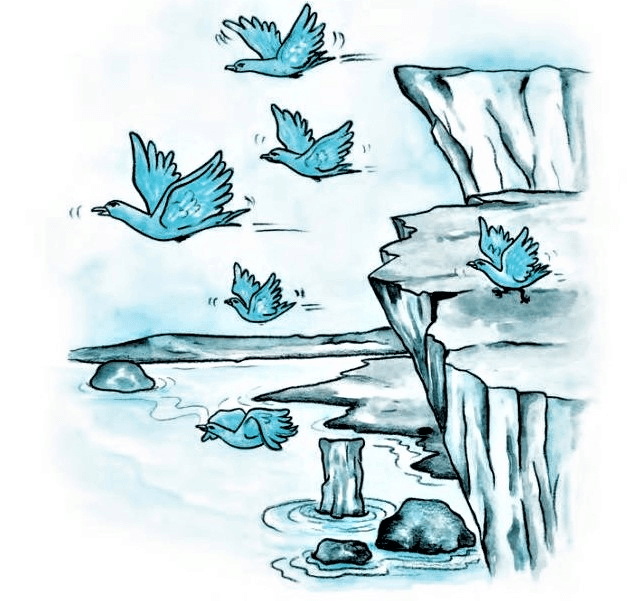 Q2: “The sight of the food maddened him.” What does this suggest? What compelled the young seagull to finally fly?
Q2: “The sight of the food maddened him.” What does this suggest? What compelled the young seagull to finally fly?
Ans: The sight of the food maddened him," suggests that the young seagull was so hungry that seeing the food triggered an intense desire to have it. The young seagull had been hungry for the past 24 hours and desperately wanted to eat something, but he could not get it, which made him furious. When he saw his mother flying upwards with a fish in her beak, it finally pushed him to spread his wings for the first time. Thus, it was the sight of the food that compelled the seagull to take the risk of flying for the first time.
Q3: “They were beckoning to him, calling shrilly. “Why did the seagull’s father and mother threaten him and cajole him to fly?
Ans: The young seagull's parents kept encouraging him, and he made several attempts to take his first flight. His two brothers and his sister had already flown away the day before. So he was left alone and hungry on the ledge. His father and mother were beckoning to him to fly shrilly. But the young seagull was too timid to fly. So they threatened to starve him on the ledge and cajoled him to fly because learning the art of flight was very necessary for a bird.
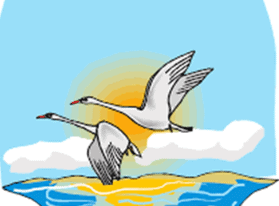
Q4: Have you ever had a similar experience, where your parents encouraged you to do something that you were too scared to try? Discuss this in pairs or groups.
Ans: Yes, I had a similar experience while trying to learn how to ride a bicycle when I was in the fourth standard. Initially, I found it difficult to balance myself and fell often, which developed a fear of cycling in me. Unable to overcome the fear, I gave up cycling, but my parents would always cajole me to try and practice cycling whenever I got time. My father would hold the bicycle from behind to help me balance myself, but whenever he let it go, I would lose balance and fall. Gradually, as I practised every day, my cycling skills improved, and I could ride it without my father’s support from behind, and this also developed my confidence to a great extent. Thus, I overcame my fear of cycling and started cycling confidently when I practised it daily. Now, I use a cycle while going to and coming from school every day.
(Note: This answer can be written based on the individual's personal experience.)
Q5: In the case of a bird flying, it seems a natural act and a foregone conclusion that it should succeed. In the examples you have given in answer to the previous question, was your success guaranteed, or was it important for you to try, regardless of the possibility of failure?
Ans: We face some problems in the initial stage while learning a new skill. Due to the fear of failure, we hesitate to perform a task or to do something new. In the case of the seagull, his parents cajoled him to fly. In the example I have given in the answer to the previous question, I was cajoled by my father to learn to cycle. So, at that stage, I was to learn cycling as it was very important for me to overcome my fear.
Yes, my success was guaranteed because if someone is determined to do something, then success is assured. Moreover, as said, practice makes a man perfect.
Speaking
Q1: We have read about the first flight of a young seagull. Your teacher will now divide the class into groups. Each group will work on one of the following topics. Prepare a presentation with your group members and then present it to the entire class.
A) Progression of models of Airplane
B) Progression of models of Motor cars
C) Birds and their wing span
D) Migratory birds - tracing their flights
Ans:
A) The very first model of an aircraft was found long ago in Egypt in 1898. And, with the dream of flying in the sky came the Wright brothers from America. They were the first in the world to successfully invent and fly the aeroplane. The two brothers set a milestone for the aviation industry. And today, there exist many models of aeroplanes and aircraft.
B) The credit for inventing the first motor car goes to a French person. He invented the first internal combustion motor car in 1808. After him, another successful discovery of the first petrol car was invented by a German engineer, Karl Benz, in 1885. And, then finally, a diesel motor car was invented in the 1890s by Rudolf Diesel.
C) Birds are amazing animals that can fly around in the sky and exist in different types of species according to different environmental conditions. Birds have wings of different lengths; some have short wings, whereas some have very large wings. The wingspan of a bird is the distance from one wingtip to another wingtip. In the living birds, the wandering albatross has the largest wingspan, ranging from 8 ft to 11 ft.
D) The birds migrate due to various reasons. The two most important reasons are the food and nesting conditions. Due to the scarcity of food in one location to the are regions with high resources of food. But a very common fact known about migrating birds is that two-thirds of the birds prefer flying at night.
Writing
Q1: Write a short composition on your initial attempt at learning a skill. You could describe the challenges of learning to ride a bicycle or learning to swim. Make it as humorous as possible.
Ans: I remember that I faced a lot of difficulties in learning to swim. The Yamuna River flows near my village, and I had the fear of swimming. But the children of my age often went there to enjoy and play in the water. I, too, wanted to enjoy, but was always taken aback due to my deep-seated fears. However, one day I decided to go to the river in the presence of my uncle. He held me with his hands, and I gave my first attempt in shallow waters. Slowly, I started to move my hands and legs and gradually began to float in water. I repeated it again and agai,n and within some days of rigorous practice, I gained a lot of confidence. Eventually, I overcame my fears and learned to swim confidently.
II. The Black Aeroplane
Thinking about the Text (Page 40)
Q1: “I’ll take the risk.” What is the risk? Why does the narrator take it?
Ans: The pilot of the Dakota DS 088 was eager to get home to England to enjoy a holiday with his family. On his way, the plane was caught in a massive storm with dark clouds surrounding it. Despite the danger, he chose to fly straight into the storm because he didn’t want to miss the chance to be with his family for a proper English breakfast. Thus, he took the risk of flying through the storm even though he could barely see anything.
Q2: Describe the narrator’s experience as he flew the aeroplane into the storm.
Ans: As the pilot (author) entered the storm, his plane started jumping and twisting. He could not see anything outside the plane as it was black. When he looked at the compass and other instruments, they had stopped functioning due to the storm. It was a terrible and fearsome experience for him. The fuel tank was almost empty, and he could not fly for more than ten minutes. Then he saw another black aeroplane by his side and the pilot of the plane signalled him to follow. It was a surprise for the narrator as the other black plane was having no lights. He followed him without any choice and landed safely on the runway.
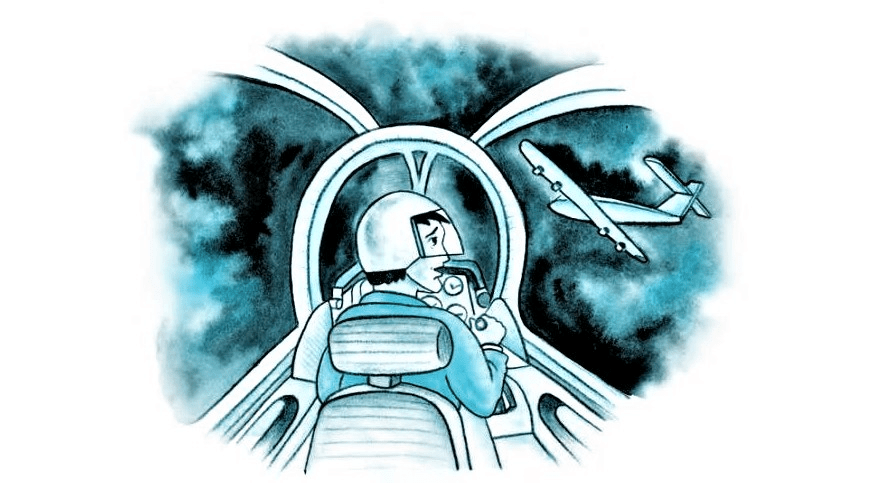
Q3: Why does the narrator say, “I landed and was not sorry to walk away from the old Dakota…”?
Ans: The narrator took the risk of flying into the dark clouds. When there was a storm in the sky he didn’t have enough fuel to fly around the clouds. All the instruments of his plane had failed. It was difficult for him to land safely. However,the pilot of a strange black aeroplane guided him to the airport and the narrator was able to land safely. Thus his life was saved and he was not sorry to walk away from the old Dakota. He wanted to forget about this dangerous journey.
His heart was filled with gratitude towards the pilot of the mysterious black aeroplane, who had guided him during such a terrifying experience. However, he did feel a tinge of sadness for not being able to properly thank his unknown benefactor, who had helped him reach the runway safely.
Q4: What made the woman in the control centre look at the narrator strangely?
Ans: The woman at the control center gave the narrator a puzzled look when he mentioned the black aeroplane that had guided him safely to the runway. She appeared surprised and informed him that there had been no other planes in the sky during the storm. According to the radar, the narrator's plane was the only one flying in the night sky at that time.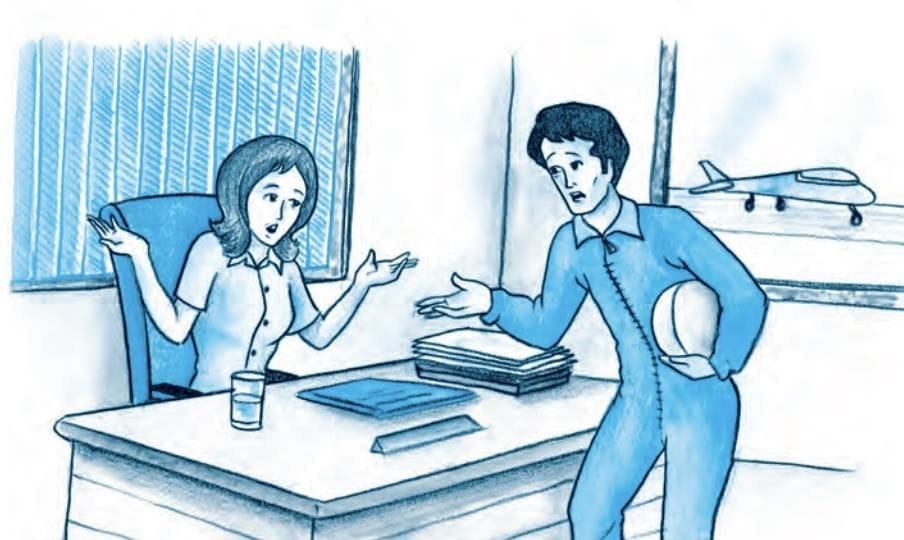
Q5: Who do you think helped the narrator to reach safely? Discuss this among yourselves and give reasons for your answer.
Ans: It is very difficult to say about the unknown pilot who helped the narrator. But probably it was the narrator himself that helped him to overcome the fear in the storm as no other plane was seen in the radar except the narrator’s Dakota plane. In that fearsome situation, he might have been hallucinating. He himself was a good pilot and brave enough who helped himself land safely.
Thinking about the Language
Q1. Try to guess the meanings of the word ‘black’ in the sentences given below. Check the meanings in the dictionary and find out whether you have guessed right.
1. Go and have a bath; your hands and face are absolutely black__________.
2. The taxi-driver gave Ratan a black look as he crossed the road when the traffic light was green. __________
3. The bombardment of Hiroshima is one of the blackest crimes against humanity. __________
4. Very few people enjoy Harold Pinter’s black comedy.__________
5. Sometimes shopkeepers store essential goods to create false scarcity and then sell these in black. __________
6. Villagers had beaten the criminal black and blue. __________
Ans:
1. The meaning of ‘black’ in this sentence is that the face and hands are dark with dust and heat.
2. Here, ‘black’ refers to an angry look.
3. Here, ‘blackest’ refers to the darkest and cruellest crime against humanity.
4. Here, ‘black’ refers to dark and gloomy comedy.
5. The meaning of ‘black’ in this sentence is that the shopkeepers sell the described goods ‘at a higher price’.
6. In this sentence, ‘black’ signifies that the criminal was severely beaten by the villagers.
Page No: 41
Q2. Match the phrases given under Column A with their meanings given under Column B: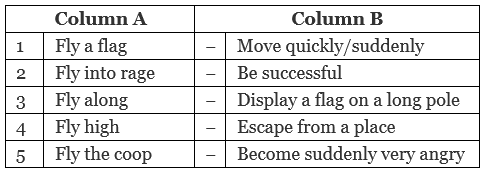
Ans: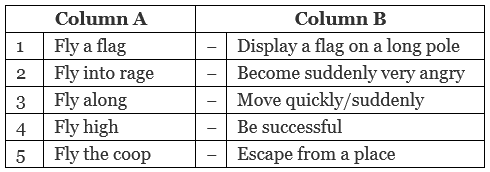
Q3. We know that the word ‘fly’ (of birds/insects) means to move through the air using wings. Tick the words which have the same or nearly the same meaning.
Ans:
The words which have the same or nearly the same meaning as ‘fly’ are as follows:
swoop, flit, flutter, ascend, float, skim, dart, hover, glide, soar, shoot, spring, sail, flap
|
61 videos|617 docs|69 tests
|
FAQs on NCERT Solutions for Class 10 English Chapter 3 - Two Stories about Flying
| 1. What are the main themes of "His First Flight" and "The Black Aeroplane"? |  |
| 2. How does the character of the young seagull evolve in "His First Flight"? |  |
| 3. What role does the weather play in "The Black Aeroplane"? |  |
| 4. How do both stories portray the concept of fear? |  |
| 5. What lessons can be learned from "His First Flight" and "The Black Aeroplane"? |  |

















